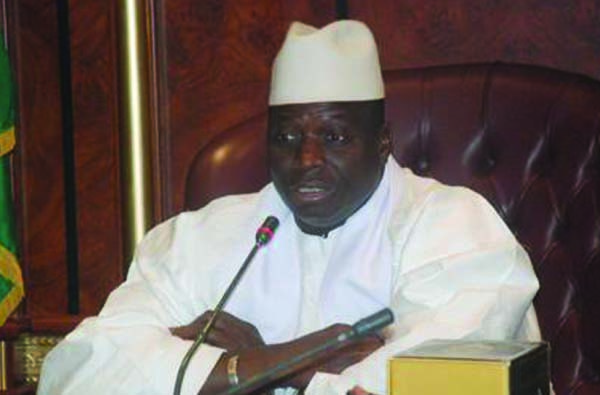
President Yahya Jammeh has opined that "access to justice and fair hearing is a fundamental human right as espoused by the 1997 constitution of the Gambia and in various international conventions and protocols on human and peoples? rights to which the government is a signatory".
In a statement delivered on his behalf by the Vice President Isatou Njie-Saidy at the launching of the National Agency for Legal Aid held yesterday at the Kairaba Beach Hotel, President Jammeh said studies have shown that a good number of persons may be languishing in remand, for the simple reason that they do not have the means to engage the services of a lawyer.
"It is noted, therefore, that such a situation represents a system that is unfair to the individual, as access to justice and fair hearing is a fundamental human right as espoused by the 1997 constitution of the Gambia and in various international conventions and protocols on human and peoples? rights of which my government is a signatory," he stated.
He added: "We as a government have, therefore, taken it upon ourselves in consultation with the people and with the collaboration of our partners, both national and international, to address this spate of injustice once and for all, and in a drastically comprehensive manner."
In President Jammeh?s view, it has and will always be his government?s objective in its drive for justice to reach the doorsteps of all and sundry in the length and breadth of the Gambia. Such an objective, he went on, can hardly be overemphasised, thus the reason courts are established all over the country and that judges and magistrates travel and sit in all parts of the country to hear cases.
"This is why the present Legal Aid Act has been formulated to replace the Poor Persons Defence Act 1993 which though indicating the importance attached to legal aid in this country, has been found narrow and short of addressing legal aid effectively," Jammeh said, adding that the thrust of the present Act is to extend the ambit and scope of legal aid to improve access to justice for the entire citizenry of this country.
According to President Jammeh, it is also expected that the establishment of this agency will contribute to the reduction in the occasional heavy backlog of cases in our courts by preparing briefs for counsels and supervising actions in the courts.
"In that case, the problem of costs and other expenses would be much lessened for the average or poor litigants; so also would the great amount of time spent in traveling and going in and out of courts," President Jammeh noted.
Also speaking at the gathering, the Chairman of the Board, Justice Lamin Jobarteh who is also a high court judge, hailed President Jammeh's government for their vision, commitment and drive towards the realization of the legal aid scheme.
Justice Jobarteh added that the scheme is out to ensure access to justice by the poor and vulnerable or otherwise disadvantaged in one way or the other to secure the services of a legal counsel.
"There are plans afoot for sensitization and awareness campaign programme on TV, radio, and the print media for the information and benefit of the Gambian people," Justice Jobarteh revealed.
Justice Minister Edward Gomez and Chief Justice of the Gambia, Justice Emmanuel Agim, both described legal aid as important to justice delivery, noting that this would help the poor and the disadvantaged to have access to justice.
The ceremony was moderated by Charles W. Sarr Thomas, Coordinator of the National Legal Aid Agency, and was graced by cabinet ministers, judges, magistrates, members of the Gambia Bar Association, members of the diplomatic and consular corps and a cross-section of the legal fraternity.
Meanwhile, the board comprises the chairman and eight other members drawn from the government, private sector and civil society organisations.


